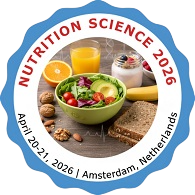About the conference
Join the “30th World Congress on Nutrition and Food Sciences”, scheduled for April 20–21, 2026, in Amsterdam, Netherlands and engage with global leaders advancing the science of nutrition and food systems.
This distinguished congress aims to convene researchers, industry experts, policymakers, clinicians and academicians to exchange insights that are shaping the future of nutrition and food sciences. Under its overarching mission of fostering evidence-based solutions and sustainable innovations, the event will address critical challenges and emerging opportunities across the sector.
A comprehensive scientific program will feature keynote addresses, plenary discussions, technical sessions, interactive workshops, and poster presentations. Core thematic areas include: human nutrition and dietetics, food chemistry and biochemistry, food safety and quality management, clinical and public health nutrition, functional foods and nutraceuticals, food technology and processing, advancements in agricultural and food sustainability, microbiology and foodborne diseases, nutrition across the lifespan, global food policy and cutting-edge research shaping the next era of food sciences.
The congress also provides an important platform for early-career researchers and students to present their work, receive constructive feedback, and collaborate with experts from diverse specialties. We welcome your participation in the "30th World Congress on Nutrition and Food Sciences" 2026 in Amsterdam, where you can take part in meaningful dialogue, expand your professional network, and contribute to the global advancement of nutrition science.
Abstract submissions are encouraged for those wishing to share original research, innovative methodologies or practical applications with an international audience.
Why to Attend our Conference?
Access to Forward-Looking Research
Gain insights into the newest findings, scientific investigations, and technological innovations shaping the future of nutrition and food sciences. Attendees will stay current with evidence-based developments that can elevate research, clinical practice and industry applications.
Engage with Leading Experts
Learn directly from distinguished scientists, educators, and industry specialists who will share their expertise on pressing issues and emerging trends. Participants can take part in thoughtful discussions on the evolving landscape of global nutrition and food systems.
High-Value Networking
Build meaningful connections with professionals from academia, healthcare, research institutions, regulatory bodies and the food industry. These interactions can open pathways to collaboration, joint research, strategic partnerships and long-term career growth.
Skill-Building Workshops and Sessions
Participate in hands-on workshops, technical sessions and applied learning modules designed to strengthen professional competencies. Discover new analytical methods, tools and best practices that can be utilized in scientific, clinical or industrial settings.
Global and Multidisciplinary Perspective
Examine how nutrition and food science challenges are addressed across various regions and cultures. The congress encourages global dialogue on food security, sustainability, policy frameworks and public health initiatives.
Inspiration from Amsterdam
Experience the dynamic cultural and scientific environment of Amsterdam. The city’s innovative spirit provides a compelling backdrop for professional learning, knowledge exchange and personal enrichment.
Professional Growth and Recognition
Enhance your professional credentials by engaging in continuing education opportunities. Stay aligned with evolving standards, regulations and best practices relevant to nutrition, dietetics, food safety and public health.
Exposure to Innovative Solutions
Explore emerging technologies, novel food systems, cutting-edge methodologies and transformative research that are redefining the field. Interact with innovators advancing sustainable food production, nutritional interventions, and health-promoting products.
Who Should Attend Our Conference?
-
Nutrition and Health Professionals: Dietitians, nutritionists, public health experts, clinical nutrition specialists, and wellness consultants.
-
Researchers and Academicians: Scientists and scholars focused on nutrition science, food technology, food chemistry, dietetics, microbiology or related disciplines.
-
Healthcare Practitioners: Physicians, medical officers and allied health professionals interested in integrating nutrition into clinical care.
-
Policy Makers and Advocates: Individuals engaged in developing food and nutrition policies, regulatory guidelines and community health initiatives.
-
Students and Early-Career Trainees: Individuals pursuing studies or training in nutrition, food sciences, biotechnology or public health.
-
Food Industry and Technology Representatives: Organizations involved in food manufacturing, product development, safety testing, nutraceuticals and digital food-tech solutions.
Sessions & Tracks
1. AI-Enabled Nutrition and Food System Intelligence
This track explores how artificial intelligence is transforming the entire food ecosystem from production to personalized nutrition. AI-driven analytics, robotics and sensor networks are now essential tools for optimizing crop productivity, forecasting demand, minimizing waste, and ensuring food safety. Attendees will examine how machine learning supports precision farming, enhances processing efficiency and enables individualized dietary planning. The session highlights how intelligent systems are reshaping global food networks toward efficiency, sustainability and improved public health outcomes.
Related Topics (Revised for Nutrition & Food Sciences)
Nutrition Conference 2026 | Global Food Science Congress 2026 | Dietetics & Clinical Nutrition Summit | Food Technology Conference | Nutrition and Dietetics Congress Amsterdam | Food Safety & Quality Conference | Public Health Nutrition Symposium 2026 | Sustainable Food Systems Conference | Functional Foods & Nutraceuticals Summit | Agricultural & Food Innovation Expo | Precision Nutrition Conference | Food Engineering & Processing Congress | Global Food Security Summit | Personalized Nutrition & Wellness Conference | Biotechnology in Food Science Forum
Related Societies (Revised for Nutrition & Food Sciences)
International Society for Nutrition & Food Sciences | Global Association of Nutrition Research | World Council for Food Safety & Quality | International Federation of Dietetics & Public Health Nutrition | Global Alliance for Sustainable Food Systems | World Society for Food Science & Technology | International Network for Nutritional Science & Wellness | Global Nutrition Innovation Forum | International Council for Food Security & Agriculture | World Organization for Nutritional Health & Food Research
2. Nutrition, Wellness and Human Health
This session focuses on the role of nutrient-dense diets in supporting physical and cognitive well-being. Discussions will address how balanced intake of macronutrients and micronutrients influences immunity, metabolism, mental resilience and long-term disease prevention. Experts will also explore how dietary patterns, whole foods and functional ingredients contribute to healthier aging and reduced chronic disease burden across populations.
Related Topics (Revised for Nutrition & Food Sciences)
Nutrition Conference 2026 | Global Food Science Congress 2026 | Dietetics & Clinical Nutrition Summit | Food Technology Conference | Nutrition and Dietetics Congress Amsterdam | Food Safety & Quality Conference | Public Health Nutrition Symposium 2026 | Sustainable Food Systems Conference | Functional Foods & Nutraceuticals Summit | Agricultural & Food Innovation Expo | Precision Nutrition Conference | Food Engineering & Processing Congress | Global Food Security Summit | Personalized Nutrition & Wellness Conference | Biotechnology in Food Science Forum
Related Societies (Revised for Nutrition & Food Sciences)
International Society for Nutrition & Food Sciences | Global Association of Nutrition Research | World Council for Food Safety & Quality | International Federation of Dietetics & Public Health Nutrition | Global Alliance for Sustainable Food Systems | World Society for Food Science & Technology | International Network for Nutritional Science & Wellness | Global Nutrition Innovation Forum | International Council for Food Security & Agriculture | World Organization for Nutritional Health & Food Research
3. Global Food Safety, Hygiene, and Quality Assurance
Ensuring safe, contamination-free food remains a critical priority across global supply chains. This track examines current practices and emerging technologies in risk mitigation, sanitation, microbial control, safe food handling, and regulatory compliance. Participants will learn about modern hygiene protocols, hazard prevention strategies, and innovations that protect consumers and strengthen confidence in the world’s food systems.
Related Topics (Revised for Nutrition & Food Sciences)
Nutrition Conference 2026 | Global Food Science Congress 2026 | Dietetics & Clinical Nutrition Summit | Food Technology Conference | Nutrition and Dietetics Congress Amsterdam | Food Safety & Quality Conference | Public Health Nutrition Symposium 2026 | Sustainable Food Systems Conference | Functional Foods & Nutraceuticals Summit | Agricultural & Food Innovation Expo | Precision Nutrition Conference | Food Engineering & Processing Congress | Global Food Security Summit | Personalized Nutrition & Wellness Conference | Biotechnology in Food Science Forum
Related Societies (Revised for Nutrition & Food Sciences)
International Society for Nutrition & Food Sciences | Global Association of Nutrition Research | World Council for Food Safety & Quality | International Federation of Dietetics & Public Health Nutrition | Global Alliance for Sustainable Food Systems | World Society for Food Science & Technology | International Network for Nutritional Science & Wellness | Global Nutrition Innovation Forum | International Council for Food Security & Agriculture | World Organization for Nutritional Health & Food Research
4. Public Health Nutrition and Population Outcomes
This track analyzes how nutrition influences community health at scale. Sessions will explore nutrient utilization, dietary interventions, malnutrition prevention and strategies for improving food access in diverse populations. Speakers will discuss public health frameworks, policy development and data-driven approaches designed to reduce diet-related diseases and promote healthier societies. Advancements in personalized and precision nutrition will also be highlighted.
Related Topics (Revised for Nutrition & Food Sciences)
Nutrition Conference 2026 | Global Food Science Congress 2026 | Dietetics & Clinical Nutrition Summit | Food Technology Conference | Nutrition and Dietetics Congress Amsterdam | Food Safety & Quality Conference | Public Health Nutrition Symposium 2026 | Sustainable Food Systems Conference | Functional Foods & Nutraceuticals Summit | Agricultural & Food Innovation Expo | Precision Nutrition Conference | Food Engineering & Processing Congress | Global Food Security Summit | Personalized Nutrition & Wellness Conference | Biotechnology in Food Science Forum
Related Societies (Revised for Nutrition & Food Sciences)
International Society for Nutrition & Food Sciences | Global Association of Nutrition Research | World Council for Food Safety & Quality | International Federation of Dietetics & Public Health Nutrition | Global Alliance for Sustainable Food Systems | World Society for Food Science & Technology | International Network for Nutritional Science & Wellness | Global Nutrition Innovation Forum | International Council for Food Security & Agriculture | World Organization for Nutritional Health & Food Research
5. Advanced Food Engineering and Processing Technologies
This session features modern engineering solutions that enhance food production, preservation and sustainability. Topics include novel processing methods such as high-pressure treatment, thermal and non-thermal technologies, automation and smart packaging. The track highlights how innovative engineering is redefining product quality, extending shelf life and reducing environmental impact.
Related Topics (Revised for Nutrition & Food Sciences)
Nutrition Conference 2026 | Global Food Science Congress 2026 | Dietetics & Clinical Nutrition Summit | Food Technology Conference | Nutrition and Dietetics Congress Amsterdam | Food Safety & Quality Conference | Public Health Nutrition Symposium 2026 | Sustainable Food Systems Conference | Functional Foods & Nutraceuticals Summit | Agricultural & Food Innovation Expo | Precision Nutrition Conference | Food Engineering & Processing Congress | Global Food Security Summit | Personalized Nutrition & Wellness Conference | Biotechnology in Food Science Forum
Related Societies (Revised for Nutrition & Food Sciences)
International Society for Nutrition & Food Sciences | Global Association of Nutrition Research | World Council for Food Safety & Quality | International Federation of Dietetics & Public Health Nutrition | Global Alliance for Sustainable Food Systems | World Society for Food Science & Technology | International Network for Nutritional Science & Wellness | Global Nutrition Innovation Forum | International Council for Food Security & Agriculture | World Organization for Nutritional Health & Food Research
6. Sustainable Food Production & Eco-Efficient Agriculture
Attendees will explore cutting-edge solutions that promote environmentally conscious farming. Topics include regenerative agriculture, climate-smart practices, soil restoration, vertical farming, aquaponics and water-efficient production systems. The track emphasizes how sustainability-driven innovation ensures long-term food security and supports global environmental commitments.
Related Topics (Revised for Nutrition & Food Sciences)
Nutrition Conference 2026 | Global Food Science Congress 2026 | Dietetics & Clinical Nutrition Summit | Food Technology Conference | Nutrition and Dietetics Congress Amsterdam | Food Safety & Quality Conference | Public Health Nutrition Symposium 2026 | Sustainable Food Systems Conference | Functional Foods & Nutraceuticals Summit | Agricultural & Food Innovation Expo | Precision Nutrition Conference | Food Engineering & Processing Congress | Global Food Security Summit | Personalized Nutrition & Wellness Conference | Biotechnology in Food Science Forum
Related Societies (Revised for Nutrition & Food Sciences)
International Society for Nutrition & Food Sciences | Global Association of Nutrition Research | World Council for Food Safety & Quality | International Federation of Dietetics & Public Health Nutrition | Global Alliance for Sustainable Food Systems | World Society for Food Science & Technology | International Network for Nutritional Science & Wellness | Global Nutrition Innovation Forum | International Council for Food Security & Agriculture | World Organization for Nutritional Health & Food Research
7. Personalized Nutrition, Digital Diets and Precision Wellness
This session examines the rapidly growing field of individualized nutrition based on genetics, biomarkers, lifestyle and digital health data. Through advanced diagnostics and AI analytics, personalized dietary strategies are becoming central to disease prevention and wellness optimization. Experts will discuss emerging tools that help individuals tailor diets to their unique physiological needs.
Related Topics (Revised for Nutrition & Food Sciences)
Nutrition Conference 2026 | Global Food Science Congress 2026 | Dietetics & Clinical Nutrition Summit | Food Technology Conference | Nutrition and Dietetics Congress Amsterdam | Food Safety & Quality Conference | Public Health Nutrition Symposium 2026 | Sustainable Food Systems Conference | Functional Foods & Nutraceuticals Summit | Agricultural & Food Innovation Expo | Precision Nutrition Conference | Food Engineering & Processing Congress | Global Food Security Summit | Personalized Nutrition & Wellness Conference | Biotechnology in Food Science Forum
Related Societies (Revised for Nutrition & Food Sciences)
International Society for Nutrition & Food Sciences | Global Association of Nutrition Research | World Council for Food Safety & Quality | International Federation of Dietetics & Public Health Nutrition | Global Alliance for Sustainable Food Systems | World Society for Food Science & Technology | International Network for Nutritional Science & Wellness | Global Nutrition Innovation Forum | International Council for Food Security & Agriculture | World Organization for Nutritional Health & Food Research
8. Smart Food Safety Technologies & Transparent Supply Chains
This track focuses on next-generation safety and traceability solutions using blockchain, IoT sensors and advanced analytics. Attendees will learn how real-time monitoring ensures product authenticity, reduces contamination risks and strengthens regulatory compliance. These systems are key to building trustworthy, resilient and transparent global supply chains.
Related Topics (Revised for Nutrition & Food Sciences)
Related Societies (Revised for Nutrition & Food Sciences)
9. Novel Protein Sources and Biotechnological Innovations
With growing global demand for sustainable protein, this track explores breakthroughs in plant-based proteins, cell-cultured meat, fermentation-derived ingredients and insect proteins. Sessions highlight how biotechnology supports ethical sourcing, reduced emissions and greater resource efficiency, while meeting nutritional needs and consumer expectations.
Related Topics (Revised for Nutrition & Food Sciences)
Nutrition Conference 2026 | Global Food Science Congress 2026 | Dietetics & Clinical Nutrition Summit | Food Technology Conference | Nutrition and Dietetics Congress Amsterdam | Food Safety & Quality Conference | Public Health Nutrition Symposium 2026 | Sustainable Food Systems Conference | Functional Foods & Nutraceuticals Summit | Agricultural & Food Innovation Expo | Precision Nutrition Conference | Food Engineering & Processing Congress | Global Food Security Summit | Personalized Nutrition & Wellness Conference | Biotechnology in Food Science Forum
Related Societies (Revised for Nutrition & Food Sciences)
International Society for Nutrition & Food Sciences | Global Association of Nutrition Research | World Council for Food Safety & Quality | International Federation of Dietetics & Public Health Nutrition | Global Alliance for Sustainable Food Systems | World Society for Food Science & Technology | International Network for Nutritional Science & Wellness | Global Nutrition Innovation Forum | International Council for Food Security & Agriculture | World Organization for Nutritional Health & Food Research
10. Circular Food Systems & Zero-Waste Strategies
This session emphasizes redesigning food systems to minimize waste and repurpose by-products. Discussions include resource recovery, composting technologies, upcycling food residues and developing circular value chains. These innovations are essential for lowering emissions, reducing economic losses and creating sustainable, closed-loop food ecosystems.
Related Topics (Revised for Nutrition & Food Sciences)
Nutrition Conference 2026 | Global Food Science Congress 2026 | Dietetics & Clinical Nutrition Summit | Food Technology Conference | Nutrition and Dietetics Congress Amsterdam | Food Safety & Quality Conference | Public Health Nutrition Symposium 2026 | Sustainable Food Systems Conference | Functional Foods & Nutraceuticals Summit | Agricultural & Food Innovation Expo | Precision Nutrition Conference | Food Engineering & Processing Congress | Global Food Security Summit | Personalized Nutrition & Wellness Conference | Biotechnology in Food Science Forum
Related Societies (Revised for Nutrition & Food Sciences)
International Society for Nutrition & Food Sciences | Global Association of Nutrition Research | World Council for Food Safety & Quality | International Federation of Dietetics & Public Health Nutrition | Global Alliance for Sustainable Food Systems | World Society for Food Science & Technology | International Network for Nutritional Science & Wellness | Global Nutrition Innovation Forum | International Council for Food Security & Agriculture | World Organization for Nutritional Health & Food Research
11. Functional Foods and Bioactive Compounds for Health
This track examines foods enriched with biologically active ingredients that promote specific health benefits. Topics cover probiotics, prebiotics, antioxidants, omega-rich foods, and nutraceuticals designed to reduce disease risk and support immunity. Participants will explore product development trends and scientific evidence behind food-based health enhancement.
Related Topics (Revised for Nutrition & Food Sciences)
Nutrition Conference 2026 | Global Food Science Congress 2026 | Dietetics & Clinical Nutrition Summit | Food Technology Conference | Nutrition and Dietetics Congress Amsterdam | Food Safety & Quality Conference | Public Health Nutrition Symposium 2026 | Sustainable Food Systems Conference | Functional Foods & Nutraceuticals Summit | Agricultural & Food Innovation Expo | Precision Nutrition Conference | Food Engineering & Processing Congress | Global Food Security Summit | Personalized Nutrition & Wellness Conference | Biotechnology in Food Science Forum
Related Societies (Revised for Nutrition & Food Sciences)
International Society for Nutrition & Food Sciences | Global Association of Nutrition Research | World Council for Food Safety & Quality | International Federation of Dietetics & Public Health Nutrition | Global Alliance for Sustainable Food Systems | World Society for Food Science & Technology | International Network for Nutritional Science & Wellness | Global Nutrition Innovation Forum | International Council for Food Security & Agriculture | World Organization for Nutritional Health & Food Research
12. Smart Food Systems, Digital Agriculture & Data-Driven Decision-Making
Digital transformation is reshaping agriculture and food distribution. This track focuses on sensor-integrated farming, predictive modeling, real-time monitoring and advanced data analytics. By leveraging emerging digital tools, producers and policymakers can optimize productivity, reduce losses and build climate-resilient food systems.
Related Topics (Revised for Nutrition & Food Sciences)
Nutrition Conference 2026 | Global Food Science Congress 2026 | Dietetics & Clinical Nutrition Summit | Food Technology Conference | Nutrition and Dietetics Congress Amsterdam | Food Safety & Quality Conference | Public Health Nutrition Symposium 2026 | Sustainable Food Systems Conference | Functional Foods & Nutraceuticals Summit | Agricultural & Food Innovation Expo | Precision Nutrition Conference | Food Engineering & Processing Congress | Global Food Security Summit | Personalized Nutrition & Wellness Conference | Biotechnology in Food Science Forum
Related Societies (Revised for Nutrition & Food Sciences)
International Society for Nutrition & Food Sciences | Global Association of Nutrition Research | World Council for Food Safety & Quality | International Federation of Dietetics & Public Health Nutrition | Global Alliance for Sustainable Food Systems | World Society for Food Science & Technology | International Network for Nutritional Science & Wellness | Global Nutrition Innovation Forum | International Council for Food Security & Agriculture | World Organization for Nutritional Health & Food Research
13. Modern Food Product Innovation and Reformulation
This session covers the development of new and improved food products designed for quality, nutritional value, convenience and sustainability. Topics include clean-label innovations, plant-forward formulations, nutrient fortification and tailoring products to evolving consumer expectations. The track highlights how scientific creativity drives healthier and more diverse food choices.
Related Topics (Revised for Nutrition & Food Sciences)
Nutrition Conference 2026 | Global Food Science Congress 2026 | Dietetics & Clinical Nutrition Summit | Food Technology Conference | Nutrition and Dietetics Congress Amsterdam | Food Safety & Quality Conference | Public Health Nutrition Symposium 2026 | Sustainable Food Systems Conference | Functional Foods & Nutraceuticals Summit | Agricultural & Food Innovation Expo | Precision Nutrition Conference | Food Engineering & Processing Congress | Global Food Security Summit | Personalized Nutrition & Wellness Conference | Biotechnology in Food Science Forum
Related Societies (Revised for Nutrition & Food Sciences)
International Society for Nutrition & Food Sciences | Global Association of Nutrition Research | World Council for Food Safety & Quality | International Federation of Dietetics & Public Health Nutrition | Global Alliance for Sustainable Food Systems | World Society for Food Science & Technology | International Network for Nutritional Science & Wellness | Global Nutrition Innovation Forum | International Council for Food Security & Agriculture | World Organization for Nutritional Health & Food Research
14. Food Security in a Changing Climate
Climate change poses significant threats to global food availability. This track explores adaptive strategies, resilient crop systems, technological interventions and policy solutions that safeguard food access despite environmental pressures. Experts will assess global vulnerabilities and identify scalable, climate-focused solutions for long-term stability.
Related Topics (Revised for Nutrition & Food Sciences)
Nutrition Conference 2026 | Global Food Science Congress 2026 | Dietetics & Clinical Nutrition Summit | Food Technology Conference | Nutrition and Dietetics Congress Amsterdam | Food Safety & Quality Conference | Public Health Nutrition Symposium 2026 | Sustainable Food Systems Conference | Functional Foods & Nutraceuticals Summit | Agricultural & Food Innovation Expo | Precision Nutrition Conference | Food Engineering & Processing Congress | Global Food Security Summit | Personalized Nutrition & Wellness Conference | Biotechnology in Food Science Forum
Related Societies (Revised for Nutrition & Food Sciences)
International Society for Nutrition & Food Sciences | Global Association of Nutrition Research | World Council for Food Safety & Quality | International Federation of Dietetics & Public Health Nutrition | Global Alliance for Sustainable Food Systems | World Society for Food Science & Technology | International Network for Nutritional Science & Wellness | Global Nutrition Innovation Forum | International Council for Food Security & Agriculture | World Organization for Nutritional Health & Food Research
15. Precision Agriculture and Resource-Optimized Food Production
This session highlights advanced tools that enable targeted application of water, fertilizers and inputs through drones, satellite imaging, GPS and soil-sensing technologies. Precision farming boosts yields, protects natural resources and supports sustainable production for an expanding global population.
Related Topics (Revised for Nutrition & Food Sciences)
Nutrition Conference 2026 | Global Food Science Congress 2026 | Dietetics & Clinical Nutrition Summit | Food Technology Conference | Nutrition and Dietetics Congress Amsterdam | Food Safety & Quality Conference | Public Health Nutrition Symposium 2026 | Sustainable Food Systems Conference | Functional Foods & Nutraceuticals Summit | Agricultural & Food Innovation Expo | Precision Nutrition Conference | Food Engineering & Processing Congress | Global Food Security Summit | Personalized Nutrition & Wellness Conference | Biotechnology in Food Science Forum
Related Societies (Revised for Nutrition & Food Sciences)
International Society for Nutrition & Food Sciences | Global Association of Nutrition Research | World Council for Food Safety & Quality | International Federation of Dietetics & Public Health Nutrition | Global Alliance for Sustainable Food Systems | World Society for Food Science & Technology | International Network for Nutritional Science & Wellness | Global Nutrition Innovation Forum | International Council for Food Security & Agriculture | World Organization for Nutritional Health & Food Research
16. Interactive Workshops, Collaboration Forums & Professional Networking
Designed to facilitate engagement and hands-on learning, these sessions allow participants to collaborate, exchange insights and build professional networks. Attendees can participate in problem-solving discussions, cross-disciplinary activities and partnership-oriented dialogues that support innovation and professional growth.
Related Topics (Revised for Nutrition & Food Sciences)
Nutrition Conference 2026 | Global Food Science Congress 2026 | Dietetics & Clinical Nutrition Summit | Food Technology Conference | Nutrition and Dietetics Congress Amsterdam | Food Safety & Quality Conference | Public Health Nutrition Symposium 2026 | Sustainable Food Systems Conference | Functional Foods & Nutraceuticals Summit | Agricultural & Food Innovation Expo | Precision Nutrition Conference | Food Engineering & Processing Congress | Global Food Security Summit | Personalized Nutrition & Wellness Conference | Biotechnology in Food Science Forum
Related Societies (Revised for Nutrition & Food Sciences)
International Society for Nutrition & Food Sciences | Global Association of Nutrition Research | World Council for Food Safety & Quality | International Federation of Dietetics & Public Health Nutrition | Global Alliance for Sustainable Food Systems | World Society for Food Science & Technology | International Network for Nutritional Science & Wellness | Global Nutrition Innovation Forum | International Council for Food Security & Agriculture | World Organization for Nutritional Health & Food Research
17. Consumer Choices, Sustainability Trends, and Dietary Shifts
This track investigates how consumer values are evolving toward sustainability, plant-based diets, clean labels and health-focused choices. Understanding behavioral drivers helps researchers and industry leaders design products and campaigns that align with global demand for responsible and nutritious food.
Related Topics (Revised for Nutrition & Food Sciences)
Nutrition Conference 2026 | Global Food Science Congress 2026 | Dietetics & Clinical Nutrition Summit | Food Technology Conference | Nutrition and Dietetics Congress Amsterdam | Food Safety & Quality Conference | Public Health Nutrition Symposium 2026 | Sustainable Food Systems Conference | Functional Foods & Nutraceuticals Summit | Agricultural & Food Innovation Expo | Precision Nutrition Conference | Food Engineering & Processing Congress | Global Food Security Summit | Personalized Nutrition & Wellness Conference | Biotechnology in Food Science Forum
Related Societies (Revised for Nutrition & Food Sciences)
International Society for Nutrition & Food Sciences | Global Association of Nutrition Research | World Council for Food Safety & Quality | International Federation of Dietetics & Public Health Nutrition | Global Alliance for Sustainable Food Systems | World Society for Food Science & Technology | International Network for Nutritional Science & Wellness | Global Nutrition Innovation Forum | International Council for Food Security & Agriculture | World Organization for Nutritional Health & Food Research
18. Integrated Food Waste Reduction & Resource Management
This session addresses waste minimization strategies across production, processing, retail and consumption. Topics include redistribution networks, composting innovations, waste-to-energy systems and community-level interventions. Effective waste management supports environmental protection, economic efficiency, and food system resilience.
Related Topics (Revised for Nutrition & Food Sciences)
Nutrition Conference 2026 | Global Food Science Congress 2026 | Dietetics & Clinical Nutrition Summit | Food Technology Conference | Nutrition and Dietetics Congress Amsterdam | Food Safety & Quality Conference | Public Health Nutrition Symposium 2026 | Sustainable Food Systems Conference | Functional Foods & Nutraceuticals Summit | Agricultural & Food Innovation Expo | Precision Nutrition Conference | Food Engineering & Processing Congress | Global Food Security Summit | Personalized Nutrition & Wellness Conference | Biotechnology in Food Science Forum
Related Societies (Revised for Nutrition & Food Sciences)
International Society for Nutrition & Food Sciences | Global Association of Nutrition Research | World Council for Food Safety & Quality | International Federation of Dietetics & Public Health Nutrition | Global Alliance for Sustainable Food Systems | World Society for Food Science & Technology | International Network for Nutritional Science & Wellness | Global Nutrition Innovation Forum | International Council for Food Security & Agriculture | World Organization for Nutritional Health & Food Research
Visa Process
Guidelines:
30th World Congress on Nutrition and Food Sciences, April 20–21, 2026 | Amsterdam, Netherlands
The following step-by-step guidance will help you navigate the Schengen visa procedure for attending the "30th World Congress on Nutrition and Food Sciences" in Amsterdam, Netherlands.
1. Choose the Appropriate Visa Category
Applicants attending this professional conference must apply for a Short-Stay Schengen Type C Visa (Business Category), which permits participation in scientific, academic or business events in the Netherlands.
2. Required Documentation
Prepare and submit the following documents as part of your application:
· Valid passport (must meet Schengen validity requirements)
· Two recent passport-size photographs
· Official conference invitation letter
· Proof of registration and payment for the congress
· A cover letter outlining the purpose of travel, duration of stay, and funding details
· Proof of accommodation in Amsterdam (hotel booking or provided lodging)
· Round-trip travel itinerary or flight reservation
3. Application Timeline
Schengen visa applications can be submitted from 6 months before the travel date and no later than 15 calendar days prior to departure.
Standard processing time is approximately 15 calendar days, though this may vary by region.
4. Booking Your Appointment
Applications for the Netherlands must be initiated through the Netherlands Visa Application System (via VFS Global).
You will need to:
· Complete your visa form online through the Netherlands Visa Portal
· Schedule an appointment at your designated VFS Global center
· Present all required documentation at the time of your appointment
5. Biometrics and Interview
All applicants must provide biometric data (fingerprints and photograph) unless such data has been captured within the past 59 months.
A brief interview may be conducted, particularly for first-time applicants attending an international conference.
6. Post-Submission Process
You may track the status of your application through the VFS Global tracking system.
You will be notified when your passport is ready for collection, along with the outcome of your visa decision.
Market Analysis
Market Analysis
The global nutrition and food science sector continues to expand rapidly, driven by increasing consumer awareness, accelerating interest in preventive healthcare, advancements in food technology and the rising demand for sustainable and functional foods. Industry data highlights strong growth momentum across multiple segments of the nutrition value chain.
Recent market insights indicate:
-
The global nutrition market was valued at approximately USD 370 billion in 2023 and is projected to reach USD 560 billion by 2030, registering a compound annual growth rate (CAGR) of nearly 6.1%.
-
Increased prevalence of lifestyle-related conditions—such as diabetes, obesity, cardiovascular disease, and micronutrient deficiencies—continues to elevate global demand for evidence-based nutritional solutions.
-
According to the World Health Organization (WHO), malnutrition in all its forms (undernutrition, obesity, and micronutrient deficiencies) remains one of the leading contributors to the global disease burden.
-
Rapid growth in digital nutrition platforms, personalized nutrition, nutraceuticals, and sustainable food systems is reshaping the industry landscape.
Industry Growth
The nutrition and food sciences market is poised for sustained expansion, supported by scientific innovation, regulatory advancements, and global investments in healthier, safer and more efficient food systems. These trends reinforce the relevance and urgency of hosting large-scale scientific gatherings such as this world congress.
Target Audience
The congress aims to engage nutrition scientists, dietitians, food technologists, public health experts, researchers, policymakers, industry leaders and students. Growing interdisciplinary interest from healthcare, agriculture, biotechnology and food manufacturing broadens participation across diverse sectors.
Competitive Landscape / Similar Conferences
Comparable global events include the Nutrition Society meetings, the International Congress of Dietetics (ICD), the American Society for Nutrition (ASN) annual conference, and regional food technology summits. Benchmarking themes, attendee volumes, and scientific output from these conferences helps identify positioning opportunities for the 30th World Congress.
Unique Value Proposition
Key differentiators of the 30th World Congress on Nutrition and Food Sciences may include its strategic location in Amsterdam, expert-led keynote sessions, emphasis on emerging areas such as precision nutrition, sustainable food systems, and advanced food technologies, as well as a strong international research presence.
Geographic Distribution of Participants
The congress is expected to draw a diverse global audience, particularly from Europe, North America, Asia-Pacific and regions with active research clusters in nutrition and food science.
Professional Background of Attendees
Participants will include experienced professionals, early-career researchers, clinicians, academicians, regulatory authorities and innovators from the food and nutrition industry. This blend supports high-value networking and knowledge exchange.
Budget and Funding Considerations
Primary revenue sources include registration fees, sponsorship packages, exhibitor participation, and institutional support. Economic conditions, travel budgets and organizational funding cycles must be assessed to optimize pricing and financial planning.
Marketing and Outreach Strategy
A comprehensive promotional strategy will leverage digital marketing, academic networks, scientific journals, institutional partnerships and social media campaigns. Collaborations with universities, research institutes and industry associations will strengthen reach and visibility.
Sponsorship Packages
Tiered sponsorship structures can be offered to attract organizations across nutrition, biotechnology, food manufacturing, and health sectors. Benefits may include branding exposure, keynote slots, exhibition booths, and digital promotions.
Exhibitor Opportunities
The event will provide a platform for companies to showcase innovative products, technologies, and research—from nutraceuticals and dietary supplements to laboratory equipment, food-processing technologies, and digital nutrition tools.
Scientific Program Development
The congress program should feature high-quality presentations, symposia, panel discussions and workshops addressing major challenges such as food security, nutritional epidemiology, novel food processing methods and advancements in clinical and community nutrition.
Post-Event Engagement
Sustaining engagement through post-conference communications, knowledge-sharing newsletters, publication opportunities and invitations to future events helps build an active global community.
Risk Mitigation Strategies
Contingency planning should account for economic fluctuations, travel restrictions, logistical uncertainties and technological challenges. Flexible event design and early risk assessments will support smooth execution.
Benefits for Participants
Professional Development
Knowledge Advancement:
Stay informed about the latest scientific research, technological innovations and emerging trends in nutrition and food sciences, including clinical nutrition, functional foods, food safety and sustainable food systems.
Skill Enhancement:
Participate in hands-on workshops, technical demonstrations, and interactive sessions designed to strengthen analytical, research, and applied nutrition skills.
Networking Opportunities
Global Professional Connections:
Engage with nutritionists, dietitians, food scientists, researchers, academicians, policymakers, and industry leaders from across the world.
Collaborative Opportunities:
Identify prospective research collaborators, institutional partners, and industry connections for future projects, publications, or product development.
Exposure to Innovations
Cutting-Edge Research:
Explore breakthrough findings in areas such as personalized nutrition, nutrigenomics, food biotechnology, and sustainable food production.
New Tools and Technologies:
Discover advanced laboratory tools, nutritional assessment technologies, food-processing innovations, and digital health solutions transforming global nutrition.
Insights from Experts
Keynote Sessions:
Gain perspectives from globally recognized experts and thought leaders addressing critical challenges and advancements in the nutrition ecosystem.
Panel Discussions:
Engage in expert-led dialogues on food security, global dietary trends, public health nutrition gaps, policy frameworks, and future directions for nutrition science.
Career Advancement
Professional Profile Building:
Strengthen your CV or academic portfolio by participating in high-level scientific discussions, presenting research, or contributing to conference dialogues.
Employment and Research Opportunities:
Network with organizations, universities, and companies seeking skilled professionals or research collaborators.
Access to Resources
Conference Materials:
Receive comprehensive access to scientific abstracts, presentation slides, research papers, and session recordings.
Exhibition Hall:
Interact with exhibitors showcasing innovations in nutrition products, supplements, laboratory equipment, food technology systems and research platforms.
Cultural Experience
Global Perspectives:
Understand nutrition practices, dietary patterns and research approaches from diverse cultural and geographic backgrounds.
Local Culture:
Enjoy the rich cultural heritage of Amsterdam, its culinary diversity, and its globally renowned scientific and innovation ecosystem.
Continuing Education Credits
Certification:
Earn professional development certificates or continuing education credits (where applicable), contributing to academic and career advancement requirements.
Personal Growth
Inspiration:
Gain inspiration from pioneering research, transformative ideas and success stories in the nutrition and food sciences community.
Motivation:
Return to your practice, studies or research with renewed energy, deeper insights, and enhanced motivation.





































